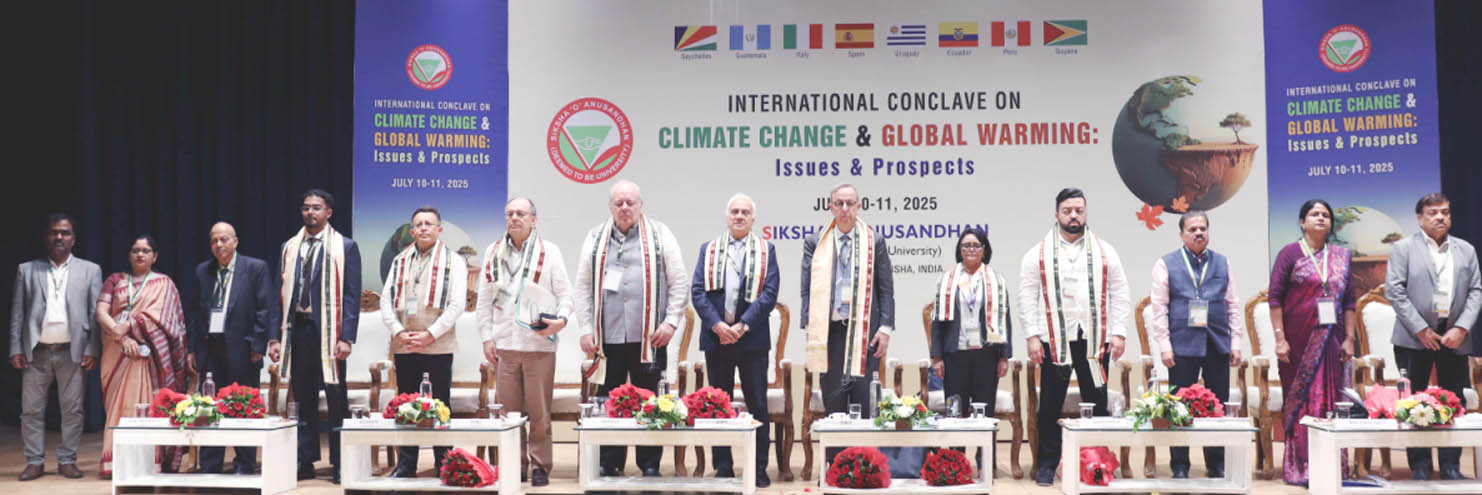Bhubaneswar: Ambassadors and diplomats from eight countries convened in Bhubaneswar on Thursday, expressing grave concerns over the escalating impact of climate change and global warming. They collectively urged for decisive action to safeguard the planet during the inaugural session of a two-day international conclave titled “Climate Change and Global Warming—Issues and Prospects,” organized by SOA Deemed to be University.
“It is not a distant threat; it stands as a huge challenge before humanity,” stated Mr. Juan Antonio March Pujol, Ambassador of Spain, emphasizing the immediate need for intervention.
The conclave drew a distinguished gathering of international representatives, including Mr. Alberto Guani, Ambassador of Uruguay; Mr. Javier Paulinich, Ambassador of Peru; Mr. Fernando Bucheli, Ambassador of Ecuador; Mr. Omar Castaneda Solares, Ambassador of Guatemala; Mr. Antonio Bartoli, Ambassador of Italy; Ms. Lalatiana Accouche, High Commissioner of Seychelles; and Mr. Kayshav Tewari, Diplomat, High Commission of Guyana.
Key Insights from Indian Experts and Global Representatives
Dr. Mrutyunjay Mohapatra, Director General of the Indian Meteorological Department (IMD), delivered the keynote address, highlighting how the release of greenhouse gases due to human and socio-economic activity has led to the current situation, manifesting in increasingly frequent extreme weather events. He noted the shrinking of natural carbon sinks like forests and wetlands due to deforestation, though he assured that measures are being taken to prevent further loss and protect water bodies. Dr. Mohapatra also detailed the economic impact of climate change, citing a 6 to 10 percent reduction in agricultural yield due to rising temperatures, along with adverse effects on fishing. He stressed the importance of early warning systems in vulnerable regions and the pursuit of sustainable development practices at the micro-level.
Prof. (Dr.) Neeta Mohanty, Acting Vice-Chancellor of SOA, presided over the session, while Prof. (Dr.) Prasenjit Mohanty, Pro-Vice Chancellor of SOA, extended a warm welcome to the guests. Prof. Uma Charan Mohanty, a Distinguished Professor at SOA and a renowned environmental expert, announced that the conference would feature 17 speakers, including scientists, researchers, academics, and experts from top Indian institutions such as the IMD, Indian Institute of Tropical Meteorology (IITM), ISRO, and IITs.
Ms. Accouche, High Commissioner of Seychelles, shared her country’s plight as a small island nation severely affected by rising sea levels, coastal erosion, and extreme weather. These challenges, she explained, pose a significant threat to Seychelles’ economy, particularly its tourism and fishing industries, and its natural environment. “Though we are the least contributor to the process of global warming, we are the worst affected by its impact,” she lamented.
Mr. Tewari of Guyana echoed this sentiment, emphasizing that those who contribute the least to climate change often bear its heaviest burden. He highlighted Guyana’s proactive environmental policies, which have earned it recognition as a “green superpower.” He detailed how Guyana has protected its pristine forests, covering 85% of its geographical area, which serve as crucial carbon sinks, and argued for compensation for countries providing such global environmental benefits.
Global Commitment and Local Relevance
Ambassador Pujol reiterated Spain’s commitment to achieving carbon neutrality by 2050 and its support for European initiatives to address the climate crisis. He underscored the vital role of universities as “incubators to provide solutions” and called upon students to ensure the planet remains a safe place.
Italian Ambassador Mr. Bartoli referenced the recent, unexpected floods in Texas and noted Italy’s own struggles with record-breaking extreme weather events. He reflected on the paradox of technological advancement not guaranteeing control over nature.
Mr. Paulinich, Ambassador of Peru, shared a stark reality from his country, where 71% of glaciers, a primary source of water, are in decline. He powerfully stated, “The glaciers are retreating and facing extinction. It is not ice, but our future that is melting.”


